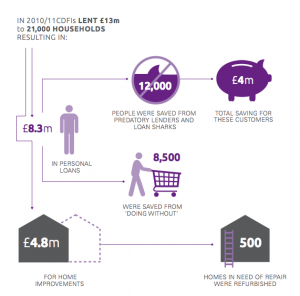05.07.2012
CDFIs combat financial exclusion and are a lifeline for many households, according to a new survey of community finance providers published today.
CDFIs provide finance and related support services to vulnerable households in the form of personal loans and home improvement equity and finance. Now a new “state of the sector” survey, Inside Community Finance, demonstrates they made 20,650 consumer loans in the last financial year (to March 2011) – an increase of 35% on the number of loans made in the year before.
Demand for consumer credit is frequently unavoidable for many vulnerable, low-income consumers. Unable to access mainstream credit, many are left to either take high cost credit or suffer privation. For people on low incomes, high cost credit can impede their ability to overcome financial difficulties, depleting their income and ability to save. Low-income, over-indebted consumers can create further strains on government and community services to meet basic living costs due to income being relegated to debt repayment.
CDFIs redress both the demand and supply sides of financial inclusion by providing customers with financial capability services and access to appropriate low-cost, fair and safe finance products. They offer responsible alternatives to high cost lenders, providing necessary products and services at a fraction of the cost to the consumer.
- CDFIs lent £13m to 21,000 households
- £8.3m of personal loans were made, of an average size of £539
- over half of CDFI customers (57%) were using high cost or illegal credit providers
- 12,000 people were saved from predatory lenders or loan sharks
- £4.8m was lent to cash-poor homeowners for home improvements and to improve substandard housing
- personal lending CDFIs received over 35,500 enquiries for consumer loans with an estimated demand valued at £15.75m
- CDFIs received over 2000 enquiries for home improvement loans with a demand valued at £32m
The future of CDFI lending to households and individuals
The Department for Work and Pensions’ Financial Inclusion Growth Fund invested over £10m in CDFIs between 2005 and 2010. Although relatively small, the Fund has been extremely significant for those CDFIs that benefited from it. But without this type of support the ability to provide household loan products to combat financial exclusion will be greatly compromised.
Harry Glavan, CDFA’s head of policy and communications, and the author of the report, says:
“The growth of doorstep and payday lenders demonstrates a need for investment into affordable alternatives. At the moment, few CDFIs specialise in serving household markets. An investment of £500m would begin to redress the gap in provision of fair and affordable finance for households across the UK.”
CDFA suggests policy changes and new structural and funding frameworks to redress gaps in the market, so that existing CDFIs can expand and new CDFIs launch where none exist, creating a more just financial system where access to fair and affordable credit is a given right for all UK businesses, civil society organisations and households.
What next?
- download Inside Community Finance (pdf, 68pp, 790kb)
- Ben Hughes, chief executive of the CDFA, and Harry Glavan, head of policy and communications, are available for interview / comment. Contact Sam Collin, Communications Officer [email protected], 020 7430 0222 x207
- Read about CDFA’s JUST Finance campaign for more support and growth for the ‘Unsung Heroes’ of the finance sector and get involved easily yourself

